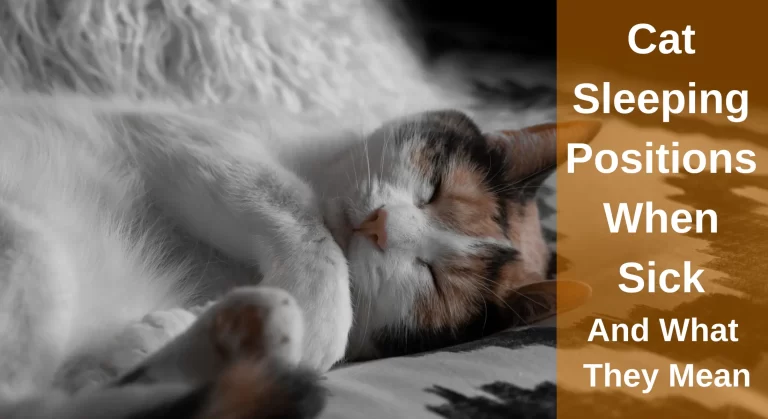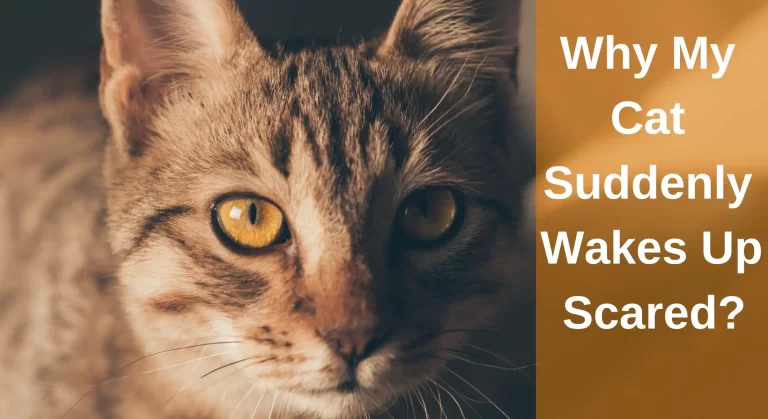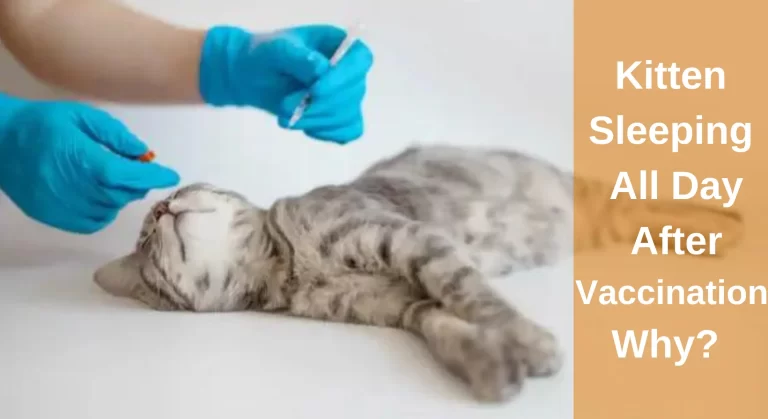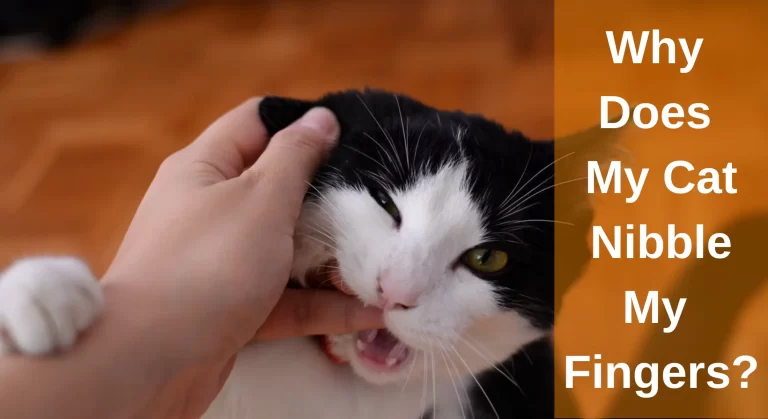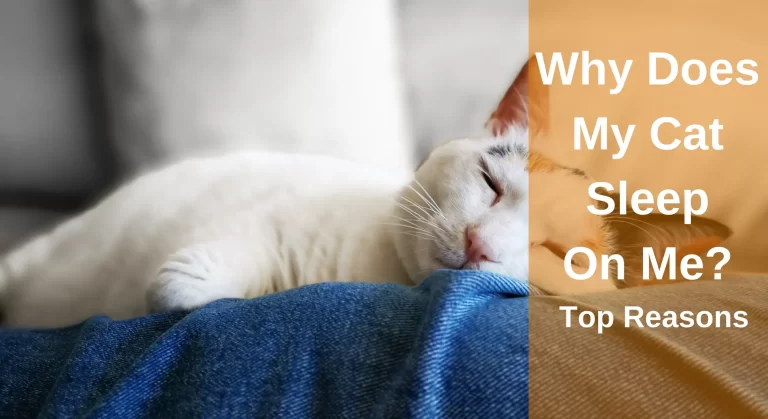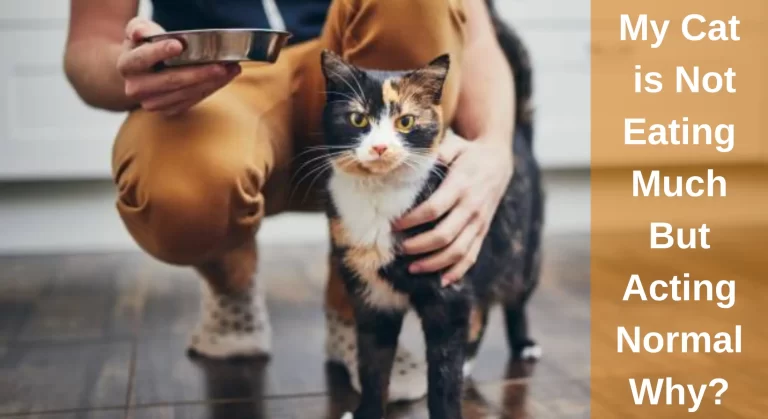My Cat Ate Rubber Band? What Should I Do
We know that felines love to play and they especially love swaying, stretchy objects that resemble living creatures. Naturally, cats like elastic bands. Rubber bands, though, aren’t a good choice for felines because they may be fatal if swallowed. Moreover, most cat owners ask why cat ate rubber bands. Why do their cats love rubber bands, and what will happen if they eat them?
Cats enjoy chasing stretchy, thread-like items that they’re able to nibble. While using rubber bands for playing may appear safe. But if swallowed, they can cause digestive problems in felines and may need to be surgically removed. Your feline may suffer a variety of potentially fatal problems based on the length and quantity of elastic band it consumes.
Has your feline consumed an elastic band? Are you concerned that your feline will get sick from the rubber band? In that case, you are in the right spot. We know it’ll be frightening for cat owners when their felines consume rubber bands. For this purpose, in this article, we’ve researched why felines love rubber bands, what happens if they consume them, what we should do next, and how we can stop them from doing so.
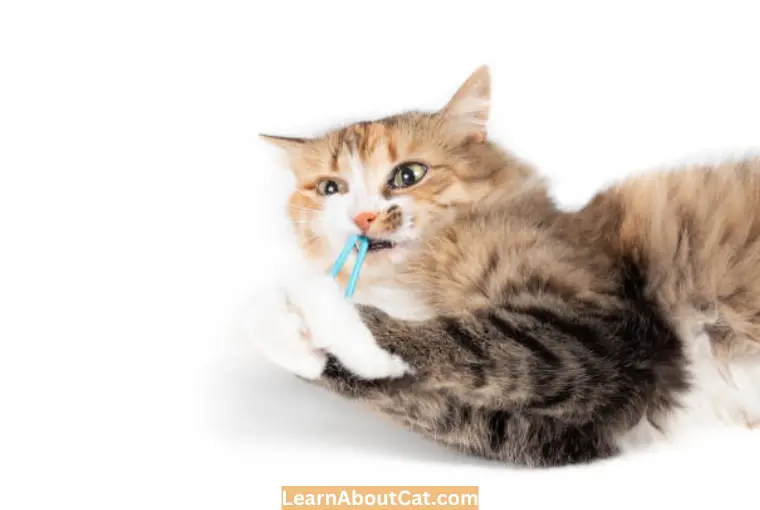
Possible Reasons: Why Do Cats Eat Rubber Bands
Cats are inquisitive creatures who like interacting with odd objects. They may amuse themselves for hours with hair ties, rubber bands, paper bags, empty boxes and even soiled socks.
1. Anxiety And Stress
If you find your cat chewing excessively on rubber bands and other similar items, it is possible that your cat is agitated, and this is their way of self-soothing. If you’re unsure of the best way to make your cat feel better, see a feline behaviourist or veterinarian who can help you figure out what’s causing your cat’s anxiety.
2. Instincts of Behaviour Of Feline Hunters
Cats are opportunistic hunters and must be ready to chase and grab whatever prey they uncover by accident. So, when cats see a rubber band or a hair tie, they see an opportunity to trap prey and maybe save it for later. This food-storing or caching propensity can explain many unusual feline behaviours.
As a result, cat toys are typically designed to resemble the sort of prey preferred by our feline pets. While rubber bands may not appear prey to humans, cats find them highly tempting because of their small size and chewy texture.
3. They Enjoy the Material
Mostly, chemicals in rubber bands may be a source of fascination for your cat. Cats have an acute sense of smell, as a feline nose has 45 to 80 million receptors. Cats may sense things in rubber bands or hair ties that people cannot sense as they have such a great sense of smell.
4. The Pica Syndrome
Pica is a condition in which your cat steals rubber bands, hair ribbons, and ties to play with and, sometimes, eat. Due to this obsessive habit, your cat will suck, lick, and even ingest inedible substances. It also appears that certain cats will engage in this suckling activity while under stress.
This syndrome has been linked to anaemia, malnutrition, or boredom. Removing specific products and materials from your house and diverting your cat’s behaviour with a positive reward can help you regulate your cat’s urges.
5. Pernicious Behaviour
Because of their bouncy nature, rubber bands may be highly fascinating, and a cat can easily become engrossed in their own hunting game. More aggressive cats may enjoy biting these elastic materials excessively, especially during playing. This may cause destructive feline habits, e.g., attacking your legs or clawing the furniture.
Check Out:My Cat Ate Plastic Wrapper: What Should I Do [Answered]
My Cat Ate a Rubber Band; What To Do?
Even though your feline buddy does not want to eat them, it may happen by mistake. Because these mishaps might occur even when we are cautious, it is critical to understand how to deal with them.
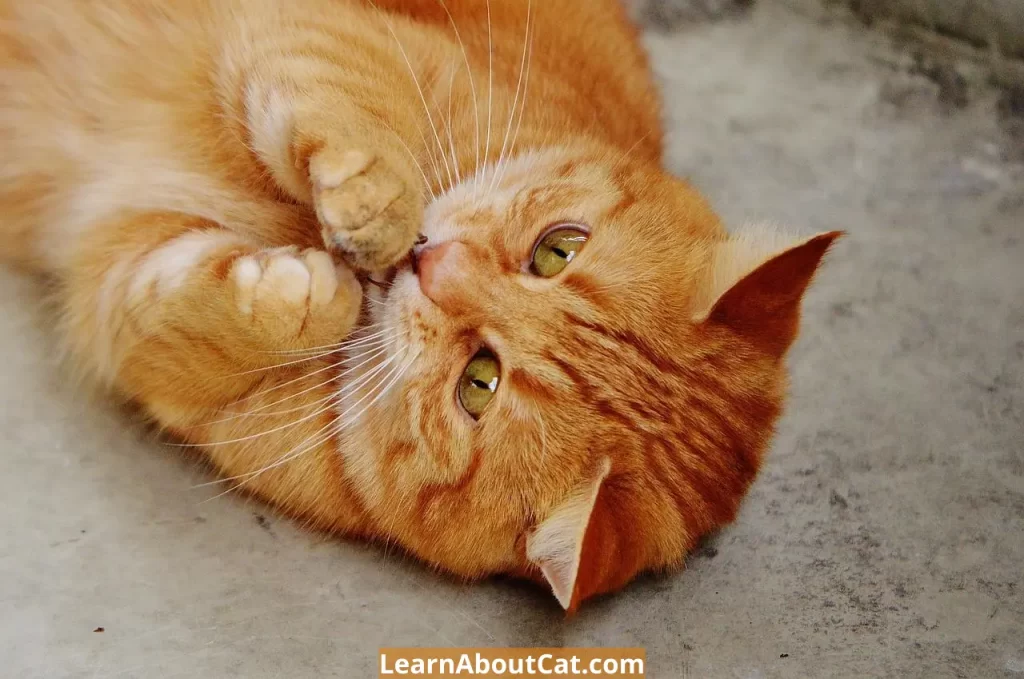
- Examine Them: Whether you suspect your cat has eaten a rubber band, open its mouth and look inside to see if it’s still there. Remove it gently if it is free to move.
- Keep Track of Your Cats’ Poop: If you look for traces of the band in the excrement, there is no need for alarm. Your cat’s stomach cannot break down rubber, yet she may pass rubber in her excrement.
- Consult Your Vet: If you feel any resistance, the only option is to take your cat to the doctor as soon as possible.
Because a rubber band is not dangerous, having it within your cat is not a hazard; rather, the harm it can do by being lodged is a possible concern.
Interesting Reading: Why Do Cats Like Adhesive?
Rubber Band Not Yet Swallowed
The very first action you need to do is to inspect your feline’s mouth to ensure that the elastic band is inside or not. If they consume an elastic band and you catch them while they’re chewing it or are seen playing with it, you can easily remove it from their mouth or stop them from playing with it.
But if you tried to punish your feline, it may then be possible that she’ll simply avoid you and swallow the rubber band. In that case, you’ll be stuck in a costly medical emergency. As you know, felines are sensitive creatures, so you must treat them with love.
Interesting Reading: My Cat Ate a Feather: What Happens When a Cat Devours a Feather
I Can See a Rubber Band in my Cat’s Mouth – What Should I Do? (Rubber Band Stuck in the Mouth)
When felines eat a rubber band, it gets stuck in their mouth or tongue. You can try removing it yourself if it is entirely secure and comfortable for your feline without jerking or twisting anything.
But kindly don’t attempt to stretch or twist the rubber band until it comes off with minimal effort. Because if you do so, the band may get trapped on their teeth, at the bottom of their tongue, or they may even swallow it. Also, you may hurt or cause severe oral injuries to your felines if you try to pull out the band.
If your cat got a rubber band stuck in his mouth, don’t give them food, water, or anything to eat at that time. Because due to consuming food, there are possibilities that they’ll consume the rubber band too.
Get in touch with your vet. Your veterinarian will inspect your feline’s mouth and, if necessary, numb or anaesthetize it so that he can safely remove the band.
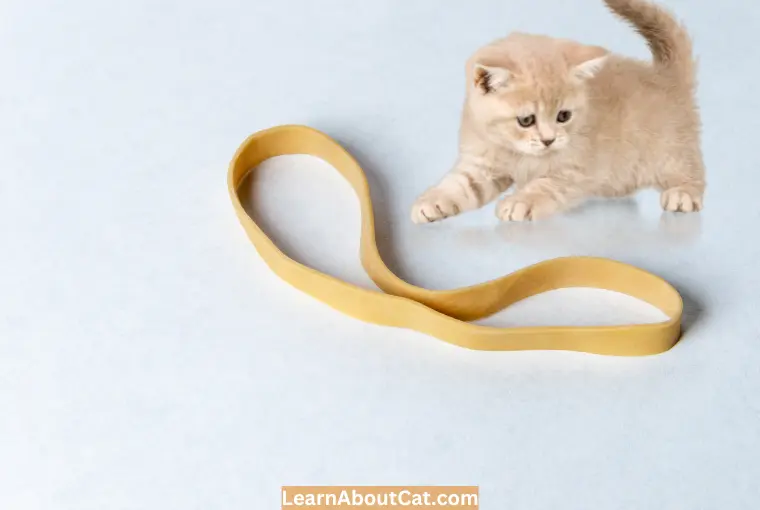
What If Your Cat Swallowed Rubber Band?
The two most serious consequences of a cat swallowing a rubber band are cell death and leiomyosarcoma.
Cell Death
If the rubber band becomes entangled in the intestines, it causes a clog that prevents your pet from eating more food and blood from flowing correctly through the organ. A prolonged loss of blood flow will result in necrosis of the affected part and death of the organ.
Leiomyosarcoma
This convoluted term refers to a very simple concept: which occurs when one portion of the intestine telescopes into another, resulting in a blockage. Because the intestines are rubbing and clawing against one another, this condition opens wounds throughout your cat’s body. Bacteria and poisons will then enter the bloodstream and create serious illnesses.
Some Warning Signs of Cats Swallowed Rubber Band
Cats who have eaten a rubber band and are experiencing potentially hazardous effects are likely to exhibit at least one of the following symptoms:
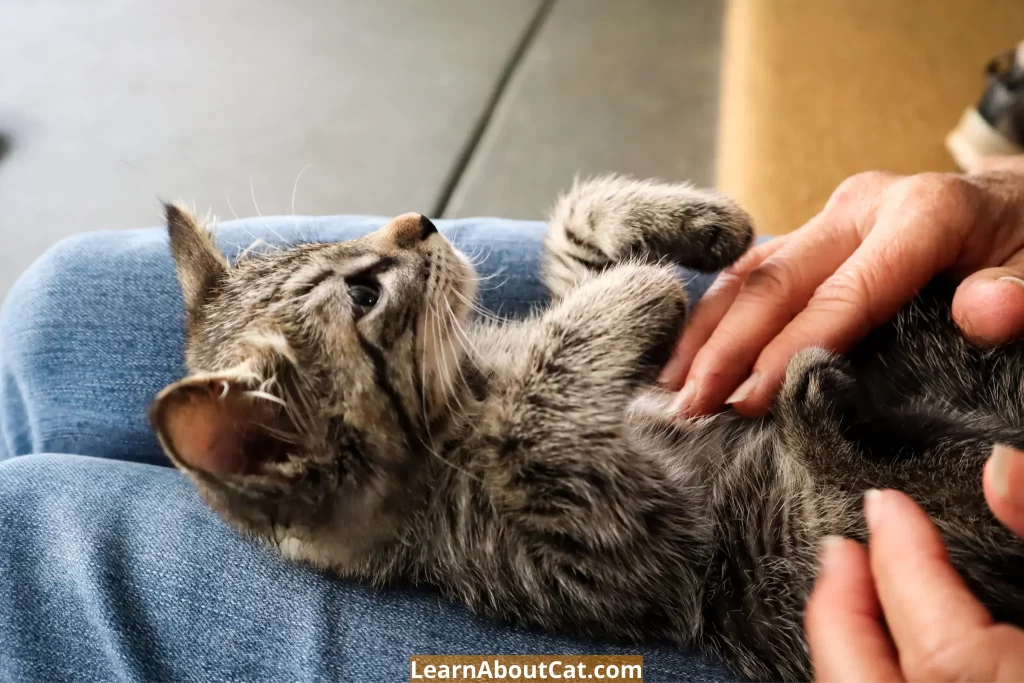
- Fever
- Doesn’t want to eat
- Diarrhoea.
- Vomiting.
- Changes in their faeces.
- Having a sore stomach.
- Abdominal pain
- Sleeping excessively and refusing to play.
- Being more silent than usual.
- Less appetite.
Complications When Your Cat Swallowed a Rubber Band
Swallowing a rubber band dangerous for your cat’s health and can result in the following problems for your cat:
- Damage to the mouth’s or food pipe’s sensitive tissues.
- Tangling of the intestines, also known as intussusception.
- Choking.
- Food pipe, stomach, or intestinal blockage.
- Tangles on the tongue.
- These problems can be significant and even fatal.
These problems can be significant and even fatal.
Also Read: Why Do Cats Like Hair Ties?
Will My Cat Be Alright After Swallowing a Rubber Band?
If the band was of an inch and they exhibited no indications of illness, they could go about their usual lives. Notify your veterinarian if your cat becomes ill, even if it has been a long since it ingested a rubber band.
Swallowing a rubber band more than 5 inches long is more likely to make your cat ill. Even if your cat looks in good condition, you should get him checked out by a veterinarian. The greater or longer the piece of rubber, the more probable major issues may occur.
How Can I Stop My Cat From Swallowing a Rubber Band?
Felines can be cunning, and because of their covert nature, detecting when they are behaving unethically may be challenging. This elastic band passion may appear weird to inexperienced cat owners and even perfectly normal.
But it’s crucial to manage with it so that your felines will develop a routine and may not harm themselves. Follow these guidelines to stop your feline from eating rubber bands:
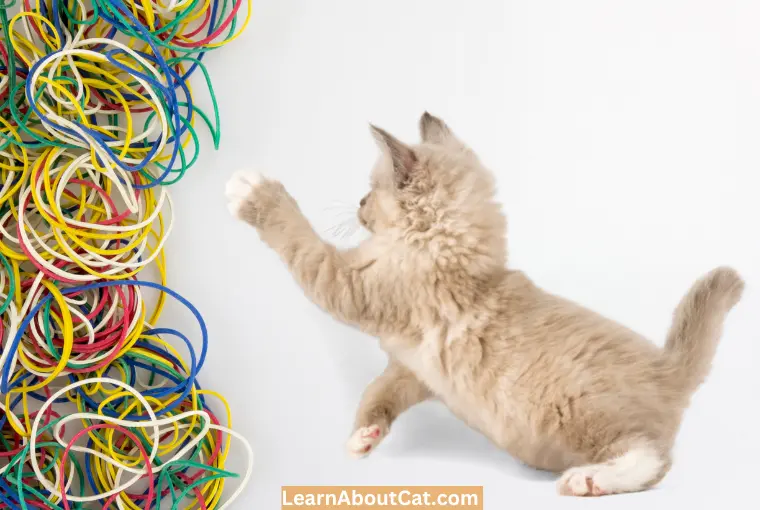
1. Provide Substitute for Rubber bands
If you find your feline has an excessive fascination with elastic bands, hairbands, or any other item that can harm them, you should first offer them a suitable substitute. If your cat loves nibbling, you might use raw kibble high in fibre or dental meals.
The next move is to engage in playful friendships with your furry friend. I believe we occasionally neglect to engage with our felines which may stimulate their predatory instincts.
2. Remove your Felines’ Stress
All felines require the same basic living requirements. However, a lot of cats have homes that lack some essential components, which can lead to anxiety-related illnesses and undesirable habits.
Finding the source of the issue is a fantastic method to reduce your cat’s undesired and dangerous behaviours. There are many reasons why your cat loves to play with elastic bands excessively, but most of the time, it’s just a way for them to relax or feel protected.
Frequently Asked Questions
Cat likes playing with rubber bands – is that OK?
No, letting your cats play with your hair tie or rubber bands is not fine. Felines who enjoy playing with elastic bands may possibly end up shredding them into small bits, which, if swallowed by your feline, may become stuck in their throats and result in choking.
Are rubber bands toxic to cats?
Since the rubber band material isn’t harmful, so it isn’t cause toxicity to your cats if it is accidentally stuck inside your felines’ throat. But it may cause potential harm by sticking in your cat’s throat or intestine.
A rubber band took lots of time to come out via pooping and varies from cat to cat. Moreover, as you know, rubber bands can’t be digested, so if they don’t come out, they’ll remain in the intestines for a very prolonged time.
How long does a cat pass a rubber band out of its system take?
A rubber band is generally eliminated from your feline’s body between 24-48 hours. You must inspect your cat’s litterbox after each faeces to ensure that the elastic band comes out or not.
Can cats choke on rubber bands?
An elastic band can block a cat’s stomach or intestinal system. It may result in choking in cats, which may be fatal. Moreover, ingesting an elastic band could harm delicate parts of your felines’ mouth, feeding tract, gut, or digestive tract.
Can A cat die from eating rubber bands?
Sadly, yes. An elastic band in the stomach can be fatal to cats. A cat’s oesophagus or guts could become blocked by a twisted elastic band, leading to other potentially fatal issues.
How long can a cat live with a blockage?
Blockage can cause many issues, such as the restriction of liquids and meals in your cat’s GI system, which lowers blood circulation. Cats having bowel blockages may die within 3-7 days.
Final Thoughts!
Although rubber bands are indigestible, if your cat consumes modest amounts of them, there should be no immediate cause for concern as chemicals will pass through his digestive tract and exit securely through his anus. As small amounts of rubber bands are unlikely to harm your kitto.
If you believe your cat has eaten a hair tie, look for symptoms such as straining to go to the toilet or vomiting; contact your veterinarian. Although hair ties can be passed in your cat’s faeces without causing any problems, significant difficulties from stomach blockages do occur sometimes.
If you believe your cat has eaten a hair tie, look for symptoms such as straining to go to the toilet or vomiting; contact your veterinarian. Although hair ties can be passed in your cat’s faeces without causing any problems, significant difficulties from stomach blockages do occur sometimes.
Related Posts:
Who is Isabella?
My name is Isabella, and I am a dedicated and knowledgeable cat enthusiast. With years of experience caring for cats and a deep love for felines, I made a mission to help other cat lovers navigate the challenges of cat ownership.

